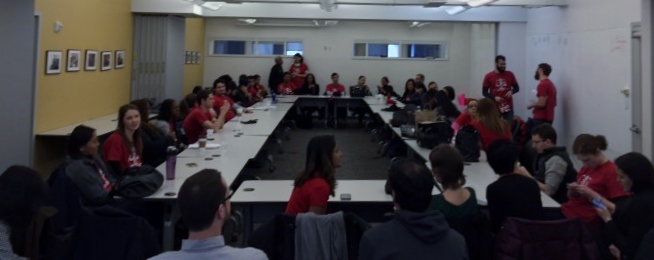|
On Friday, January 30, 2015, over 90% of MFY Legal Services’ unionized staff voted to strike.
The vote provided a clear mandate, catalyzed by concerns that management is leading a race to
the bottom with policies that discourage a diverse, experienced staff, to our clients’ detriment.
Although MFY has used its website to advertise its attractiveness to “new” attorneys, its
misleading statements about the union’s fight for workplace justice are easily debunked.

It’s Not an Offer; It’s an Insult
During the financial collapse, unionized staff accepted salaries that fell below the cost of living
in NYC. But as a result of our hard work, MFY thrived during this period, increasing its
reserves and growing in size. In fact, according to MFY’s website, its unionized staff has
increased by 26% in the past six months alone.
While publicly trumpeting its success over the last three years, however, MFY claims at the
bargaining table that the annual raises provided over that time were unsustainable. Management
has offered cost-of-living adjustments of 2.25%/2.25%/2% per year — .25% less than we
accepted in 2011. Recognizing how much fiscally stronger MFY now is, unionized staff has
sought average raises of 3% per year. This amount is affordable to MFY and enables its staff to
afford living in the city we serve.
At a time of financial strength, MFY is out of excuses.
MFY Can Do Better
Instead of making a fair offer, MFY has mischaracterized its financial state to claim the union’s
offer is unsustainable given the funding environment. For example, the website states that
“[m]ost of the organization’s long-term contracts with the city and state have remained flat for
years, while expenses have consistently gone up.” Generously considered, this statement is a
half-truth.
While several specific grants may have remained flat, the level of government grant funding as a
whole has increased greatly. (The above graph reflects fiscal year numbers. As a result, the
large amount of grant income received after July 1, 2014 is not reflected. ) Similarly, expenses
have increased over time, but mainly because MFY’s staffing levels have increased over time.
Adjusted for inflation and on a per employee basis, expenses have decreased slightly over the
past three years, while grant funding has increased significantly over that time period.
Don’t Believe the Hype
In promoting its offer, management misleadingly claims to have offered raises of 9%-23%.
These numbers conflate the “steps,” which annually compensate workers for their increased
experience, with the cost-of-living adjustment, which annually increases all salaries across the
board in recognition of their decreasing real value. MFY emphasizes how much an attorney who
begins at MFY and remains there for three years stands to benefit. The bulk of this benefit is
compensation for experience, which all reasonable business models reward. An attorney with
three years of experience is more valuable to the organization than a newly admitted attorney
with no experience, and is paid more accordingly. MFY's characterization of its offer is like
taking a high school student's income from a summer job, comparing it to that student's income
out of college and marveling at how the economy has grown in the last five years.
Management claims that the current compensation structure is sufficient to retain experienced
staff, but the organization’s attrition rate proves otherwise. In each of the past several years
MFY has lost approximately 14% of its staff. The majority of the outgoing staff are experienced,
and they are typically replaced by recent graduates. This means clients (and newer staff in need
of training) lose out on the benefit of this experience. Our clients deserve better, and so do we.
MFY’s Offer of Paid Parental Leave is Tied to Harmful and Unnecessary Givebacks
Paid parental leave incentivizes staff to stay at MFY as they take on family responsibilities and
become seasoned advocates. See Claire Cain Miller, The Economic Benefits of Paid Parental
Leave, N.Y. TIMES (Jan. 30, 2015); Susan Wojcicki, Paid Maternity Leave Is Good for Business,
WALL ST. J. (Dec. 16, 2014). Yet, MFY is the only legal services organization of its size that
provides no paid parental leave, forcing employees to cobble together sick and vacation time,
take unpaid leave without health insurance benefits, or forgo the decision to have children until
they find a new employer.
Although management has finally agreed to provide six weeks of paid leave to employees with
one year of tenure, this offer is contingent on harmful and unrelated policy changes. The first is
to eliminate a policy that encourages diversity in hiring by use of targeted advance job postings.
Although management has stated at the bargaining table that it has received no “viable”
candidates from such postings, unionized staff believes they are essential to developing a staff
that reflects the communities we serve.
The second is to require prior approval when working from an alternative location, which means
that an employee who does so in an emergency may not be compensated. Such a policy not only
undermines trust and productivity, it worsens the already overcrowded workspaces in the office,
particularly for legal assistants.
The last condition is to discriminate against employees who take paid parental leave by not
allowing them to accrue vacation or sick time while they are out, as an employee who used her
time to go on vacation would.
Download:
|